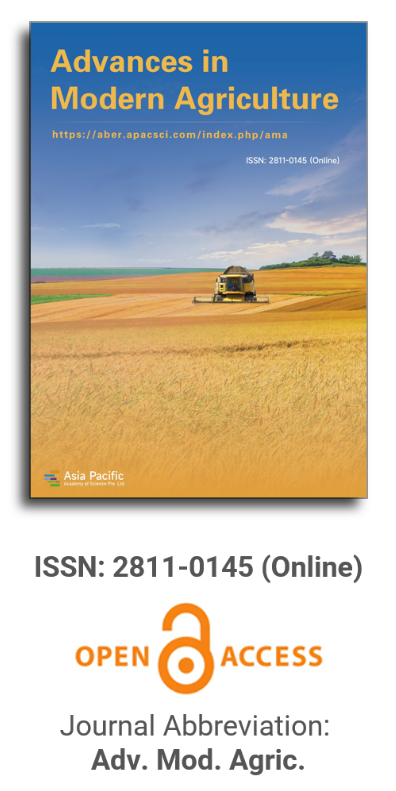


Applications of artificial intelligence in precision agriculture to ameliorate production and distribution
Vol 4, Issue 2, 2023
VIEWS - 5284 (Abstract)
Download PDF
Abstract
Automated intelligence platforms, i.e., machine learning, big data, and Internet of Things (IoT), provide new deployment opportunities within the agricultural marketing paradigm. This study attempts to derive a framework of predictive models to ameliorate crop yield and assists in understanding various features that affect crop yield. On the one hand, it investigates the impact of allied technologies, including networks with memory and generative models, and on the other, it quantitatively analyzes different agri-factors, including the management of plant growth, its quality, crop disease, inorganic fertilizer and pesticide deployment, weed management, irrigation, and field-level phenotyping. Further, the study analyzes the utilization of smart farming and the monitoring of highly dependent variables across the spectrum of precision agriculture. The conclusion is to manifest the importance of networks with memory and generative models and emphasize the vital role of artificial intelligence in transforming farm methods into a novel methodology of smart information communication technology (ICT) in fidelity agriculture. Apart from increased productivity, this study seeks to contribute to the ongoing efforts to reduce the incidence of malnutrition associated with limited access and lower production of food grains.
Keywords
References
- Talaviya T, Shah D, Patel N, et al. Implementation of artificial intelligence in agriculture for optimisation of irrigation and application of pesticides and herbicides. Artificial Intelligence in Agriculture 2020; 4: 58–73. doi: 10.1016/j.aiia.2020.04.002
- Elmoulat M, Debauche O, Mahmoudi S, et al. Edge computing and artificial intelligence for landslides monitoring. Procedia Computer Science 2020; 177: 480–487. doi: 10.1016/j.procs.2020.10.066
- Ampatzidis Y, Partel V, Costa L. Agroview: Cloud-based application to process, analyze and visualize UAV-collected data for precision agriculture applications utilizing artificial intelligence. Computers and Electronics in Agriculture 2020; 174: 105457. doi: 10.1016/j.compag.2020.105457
- Su WH. Crop plant signaling for real-time plant identification in smart farm: A systematic review and new concept in artificial intelligence for automated weed control. Artificial Intelligence in Agriculture 2020, 4: 262–271. doi: 10.1016/j.aiia.2020.11.001
- Heiden B, Alieksieiev V, Volk M, et al. Framing artificial intelligence (AI) additive manufacturing (AM). Procedia Computer Science 2021; 186: 387–394. doi: 10.1016/j.procs.2021.04.161
- Talukdar S, Pal S, Singha P. Proposing artificial intelligence based livelihood vulnerability index in river islands. Journal of Cleaner Production 2021; 284: 124707. doi: 10.1016/j.jclepro.2020.124707
- Singh H, Kumar Y. Hybrid artificial chemical reaction optimization algorithm for cluster analysis. Procedia Computer Science 2020; 167: 531–540. doi: 10.1016/j.procs.2020.03.312
- Aghelpour P, Bahrami-Pichaghchi H, Kisi O. Comparison of three different bio-inspired algorithms to improve ability of neuro fuzzy approach in prediction of agricultural drought, based on three different indexes. Computers and Electronics in Agriculture 2020; 170: 105279. doi: 10.1016/j.compag.2020.105279
- Riahi Y, Saikouk T, Gunasekaran A, et al. Artificial intelligence applications in supply chain: A descriptive bibliometric analysis and future research directions. Expert Systems with Applications 2021; 173: 114702. doi: 10.1016/j.eswa.2021.114702
- Yu H, Wen X, Li B, et al. Uncertainty analysis of artificial intelligence modeling daily reference evapotranspiration in the northwest end of China. Computers and Electronics in Agriculture 2020; 176: 105653. doi: 10.1016/j.compag.2020.105653
- Sukhbaatar S, Szlam A, Weston J, Fergus R. End-to-end memory networks. In: Cortes C, Lawrence N, Lee D, et al. (editors). Advances in Neural Information Processing Systems 28, Proceedings of the Annual Conference on Neural Information Processing Systems; 7–12 December 2015; Montreal, Quebec, Canada. pp. 2440–2448.
- Weston P, Hong R, Kaboré C, Kull CA. Farmer-managed natural regeneration enhances rural livelihoods in dryland West Africa. Environmental Management 2015; 55(6): 1402–1417. doi: 10.1007/s00267-015-0469-1
- Soni N, Sharma EK, Singh N, et al. Artificial intelligence in business: From research and innovation to market deployment. Procedia Computer Science 2020; 167: 2200–2210. doi: 10.1016/j.procs.2020.03.272
- Ahmadi F, Mehdizadeh S, Mohammadi B, et al. Application of an artificial intelligence technique enhanced with intelligent water drops for monthly reference evapotranspiration estimation. Agricultural Water Management 2021; 244: 106622. doi: 10.1016/j.agwat.2020.106622
- Seyedzadeh A, Maroufpoor S, Maroufpoor E, et al. Artificial intelligence approach to estimate discharge of drip tape irrigation based on temperature and pressure. Agricultural Water Management 2020; 228: 105905. doi: 10.1016/j.agwat.2019.105905
- Li X, Liu J, Liu D, et al. Measurement and analysis of regional agricultural water and soil resource composite system harmony with an improved random forest model based on a dragonfly algorithm. Journal of Cleaner Production 2021, 305: 127217. doi: 10.1016/j.jclepro.2021.127217
- Debauche O, Mahmoudi S, Mahmoudi SA, et al. Edge computing and artificial intelligence for real-time poultry monitoring. Procedia Computer Science 2020; 175: 534–541. doi: 10.1016/j.procs.2020.07.076
- Bhagat SK, Tung TM, Yaseen ZM. Development of artificial intelligence for modeling wastewater heavy metal removal: State of the art, application assessment and possible future research. Journal of Cleaner Production 2020; 250: 119473. doi: 10.1016/j.jclepro.2019.119473
- Liu T, Sun Y, Wang C, et al. Unmanned aerial vehicle and artificial intelligence revolutionizing efficient and precision sustainable forest management. Journal of Cleaner Production 2021; 311: 127546. doi: 10.1016/j.jclepro.2021.127546
- Kosovic IN, Mastelic T, Ivankovic D. Using Artificial Intelligence on environmental data from Internet of Things for estimating solar radiation: Comprehensive analysis. Journal of Cleaner Production 2020; 266: 121489. doi: 10.1016/j.jclepro.2020.121489
- Maruthi SP, Panigrahi T, Jagannath RPK. Distributed version of hybrid swarm intelligence-Nelder Mead algorithm for DOA estimation in WSN. Expert Systems with Applications 2020; 144: 113112. doi: 10.1016/j.eswa.2019.113112
- Anastasi S, Madonna M, Monica L. Implications of embedded artificial intelligence—Machine learning on safety of machinery. Procedia Computer Science 2021; 180: 338–343. doi: 10.1016/j.procs.2021.01.171
- Varela N, Silva J, Pineda OB, et al. Prediction of the corn grains yield through artificial intelligence. Procedia Computer Science 2020; 170: 1017–1022. doi: 10.1016/j.procs.2020.03.080
- Pathan M, Patel N, Yagnik H, et al. Artificial cognition for applications in smart agriculture: A comprehensive review. Artificial Intelligence in Agriculture 2020; 4: 81–95. doi: 10.1016/j.aiia.2020.06.001
- Lu Y, Young S. A survey of public datasets for computer vision tasks in precision agriculture. Computers and Electronics in Agriculture 2020; 178: 105760. doi: 10.1016/j.compag.2020.105760
- Zougagh N, Charkaoui A, Echchatbi A. Artificial intelligence hybrid models for improving forecasting accuracy. Procedia Computer Science 2021; 184: 817–822. doi: 10.1016/j.procs.2021.04.013
Supporting Agencies
Copyright (c) 2023 Garimella Bhaskar Narasimha Rao
License URL: https://creativecommons.org/licenses/by/4.0/

This site is licensed under a Creative Commons Attribution 4.0 International License (CC BY 4.0).

Prof. Zhengjun Qiu
Zhejiang University, China

Cheng Sun
Academician of World Academy of Productivity Science; Executive Chairman, World Confederation of Productivity Science China Chapter, China
Indexing & Archiving
In the realm of modern agriculture, the integration of cutting-edge technologies is revolutionizing the way we approach sustainable farming practices. A recent study published in Advances in Modern Agriculture titled "Classification of cotton water stress using convolutional neural networks and UAV-based RGB imagery" has garnered significant attention for its innovative approach to precision irrigation management. Conducted by researchers from Institute of Data Science and the AgriLife Research and Extension Center of Texas A&M University (authors's information is below). This study introduces a novel method for classifying cotton water stress using unmanned aerial vehicles (UAVs) and convolutional neural networks (CNNs), offering a powerful solution for optimizing water use in agriculture.
Modern agricultural technology is evolving rapidly, with scientists collaborating with leading agricultural enterprises to develop intelligent management practices. These practices utilize advanced systems that provide tailored fertilization and treatment options for large-scale land management.
This journal values human initiative and intelligence, and the employment of AI technologies to write papers that replace the human mind is expressly prohibited. When there is a suspicious submission that uses AI tools to quickly piece together and generate research results, the editorial board of the journal will reject the article, and all journals under the publisher's umbrella will prohibit all authors from submitting their articles.
Readers and authors are asked to exercise caution and strictly adhere to the journal's policy regarding the usage of Artificial Intelligence Generated Content (AIGC) tools.
Asia Pacific Academy of Science Pte. Ltd. (APACSCI) specializes in international journal publishing. APACSCI adopts the open access publishing model and provides an important communication bridge for academic groups whose interest fields include engineering, technology, medicine, computer, mathematics, agriculture and forestry, and environment.



.jpg)
.jpg)

.jpg)
